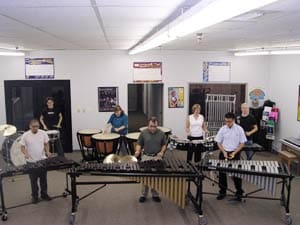Wanting a Life of Music Is Only the First Step for You or Your Child
MESA, AZ (March 19, 2004) — For generations, an introduction to music has been part of many parents' dreams for their children. Over the last decade, scientific research has added luster to that traditional pursuit by linking active music making with a variety of mental and physical benefits. But no matter how much you may want music in your own child's life, wishing won't make it so – and it's not always clear how to begin.
"Music is the one thing we do that brings everything else in our lives together," says Valerie Whitchurch, National Education Manager of American Music in Mesa. "But there are good ways to bring a child into that world, and there are pitfalls."
Whitchurch recommends that surrounding children with music at an early age, perhaps 18 months, will give them a chance to develop their own likes and dislikes – so that down the road, their participation is based on what they want. Later, when kids are old enough to take part in organized music, their parents should never force them into a particular discipline. "Not everyone's going to be in the band; not everyone's going to be in the orchestra," she notes. "Some kids are going to want to play guitar." When it comes time for lessons, music making can remain a family activity. Whitchurch advises seeking out a learning environment that's kid-centered, family-friendly and most of all flexible. "At American Music, for example, we have a Learning Center that's designed from the ground up to accommodate families, with certified lesson specialists leading both our group and individual sessions. You can try a variety of instruments without obligation, and our group lessons are incredibly affordable – just eight dollars a week. We hold Yamaha percussion lessons, keyboard and piano lessons, group drumming sessions – you name it. The point is that learning music can be an exploration at your own pace; you don't have to walk into an unfamiliar situation and lock yourself into anything." Whitchurch, an adjunct faculty member at Pima Community College in Tucson, has spent the last ten years teaching band, orchestra, choir and general music to kids in grades K through 12 throughout Arizona and Nevada. She joined American Music last year to help develop The Learning Center, a new approach to community music education. The Learning Center held an Open House on Saturday, March 20 from 2 p.m. to 4 p.m. One route Whitchurch discourages is linking music to a child's disciplinary structure. "You can't tell children that if they don't get good grades they can't be in band," she says. "You can't tell a child, 'If you don't practice, I'll take the guitar away.' Something like that is simply punitive. Instead, if they're having trouble in class or losing interest in an instrument, ask why, and do something positive. For one thing, remember it's never too late to try another instrument or another style of music." Lastly, she counsels, parents should make sure they aren't living out their own musical dreams through pressure on their children. For more information about The Learning Center, contact Whitchurch at American Music at (480) 898-1499. Visit the center at 1020 West Southern Ave., #1, in Mesa. For more information, write Yamaha Corporation of America, Band & Orchestral Division, P.O. Box 6600, Buena Park, CA 90622; telephone (714) 522-9011; or e-mail infostation@yamaha.com. |
 |
| © 2010 Yamaha Corporation of America. All rights reserved. |

